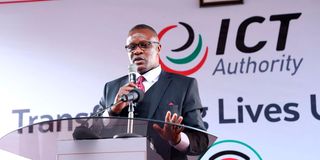CS Eliud Owalo sets up team to review key media and communications laws

Information, Communication and Digital Economy Cabinet Secretary Eliud Owalo.
Information and Digital Economy Cabinet Secretary Eliud Owalo on Friday, September 8, launched a task force comprising senior journalists, digital strategists and academics to review key laws in the sector, some of which are up to 30 years old.
Owalo said the team - which will review laws and regulations relating to broadcasting, communications, and technology - has six months to complete its mandate.
"In the last 25-30 years, there have been significant changes in technology in all sub-sectors, hence the need to update laws and policies. We have emerging technologies such as AI, big data, cryptocurrencies and other digital assets that also need to be addressed," Owalo said.
The Kenya Information and Communications Act (1998), for example, is a key legal document that drives the sector, but may not be relevant to current challenges, Mr Owalo said.
The 42-member working group is made up of the ICT Sector Team (19 members) and the Broadcast Technology Sector Team (15 members), supported by a secretariat of eight lawyers.
Professor Timothy Mwololo Waema has been appointed chairperson of the working group and will be assisted by Ms Phyllis Migwi and Dr Hanningtone Joel Gaya to ensure that the team of technocrats gets the job done in the six months.
Digital strategists Dennis Itumbi, David Nzioka, former Nation Media Group editor-in-chief Tom Mshindi, Kenya Editors Guild president Zubeida Kananu, her predecessor, and former NMG head of news Churchill Otieno are some of the members of the Broadcast Technology thematic area.
Other members in this sector include Prof Thomas Senaji, Prof Tom Olale, Carole Mundi, Sylvia Mudasa Mwichuli, Eng Vincent Adul, Eng Daniel Obam, Judy Munyinyi, Edward Mwasi and Michael Okidi.
Members of the ICT sector working group include Prof Christopher Kipchumba, Marshal Luusa, Angela Wamola, John Ooko, John Walubengo, Philip Thigo, Colonel James Kimuyu, Dennis Kute, Josephine Ndambuki, Benson Mandela, George Wanyama, John Nusu, Amrit Singh Lahburam, Anastatcia Kariuki, Daniel Ketoto and Caroline Kiai.
The secretariat consists of Christopher Karanja, Dr Erick Kibet, Anet Kerubo, Dr Amos William Omollo, Dr Latiff Lindah, Moses Kipkemoi, Joan Onyango Obunga and Mahat Somane.
Mr Somane is best known for appearing before the Supreme Court in the 2017 and 2022 presidential petitions to argue the case for the electoral body and its technology.
The task force will examine existing policy, legislative, institutional, administrative and operational structures, systems and policies, and then recommend comprehensive reforms in the sector.
It will also identify technologies and other areas requiring legal and policy intervention and make appropriate policy and legislative proposals.
“Additionally, the working group shall make any other assessment and advise on necessary reforms to enable the Ministry to meet its present mandate and expectations in a fast-changing operational environment and draft relevant bills, draft policies and strategy documents,” CS Owalo said.
Over a period of six months after its gazettement, the sector working group is expected to deliver a report accompanied by an implementation matrix, draft policy, and legislative proposals. Their term can, however, be extended if necessary at the behest of the Cabinet Secretary.
National Assembly ICT Committee Chairperson, John Kiarie said the legislators were eagerly waiting for the report from the working group so that they can speed up the adoption of the relevant bills required in improving the digital market and economy.
“The legislation and regulations manning the ICT sector need a complete overhaul since they do not match with the current times that we are living,” he said.





